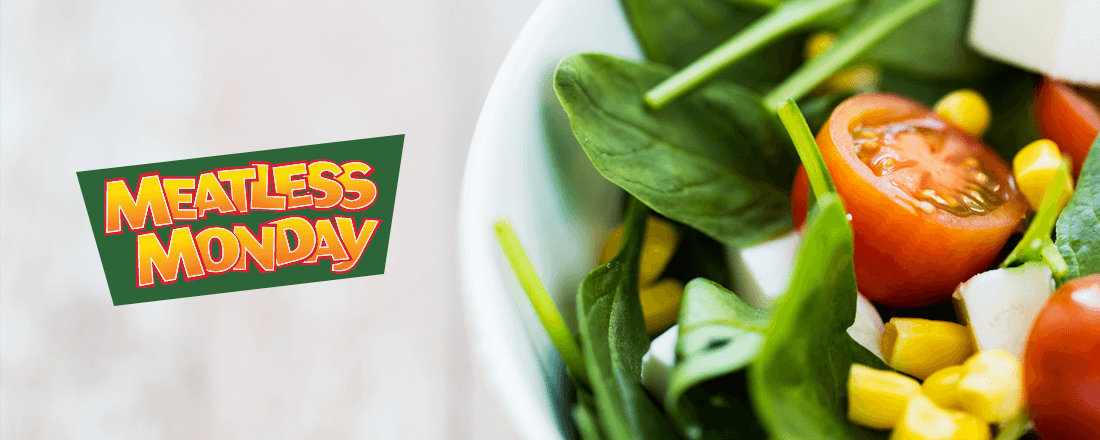
According to data from RaboResearch Food and Agribusiness, American consumption of animal protein increased five percent per capita in 2015. Individuals in the U.S. consumed nearly 271 pounds of meat that year—more per person than almost any other country on the planet—and RaboResearch scientists project U.S. protein production will continue to grow 2.5 percent per year through 2018.
That’s a lot of cows, pigs, chickens and turkeys requiring valuable resources such as water and grain, as well as a lot of families consuming dangerous amounts of saturated fat and cholesterol. But we’re a nation of burger, pork chop, and fried chicken lovers after all, so what can we really do about it? The folks at Meatless Monday have a very simple answer.
Diet Improvement Made Simple
Founded in 2003 by Sid Lerner, a former advertising professional, and Johns Hopkins Bloomberg School of Public Health, the Meatless Monday movement was born out of a desire to help Americans improve their diet in a simple yet meaningful way.
“Sid remembered that during WWII, meat rationing was common as a way for American families to reduce their consumption of a key staple and contribute to the war effort,” said Cherry Dumaual, Meatless Monday’s PR and partnerships director. “He was also familiar with a study that found that cutting out meat for one day could reduce your fat and cholesterol intake by 15 percent.”
This fact, combined with research from Johns Hopkins showing that people are more interested in and receptive to health messages on Mondays, inspired the team to launch the Meatless Monday campaign encouraging Americans to cut meat from their diet one day a week.
“The movement became really popular in 2010 when celebrities including Oprah Winfrey and Mario Batali began supporting it,” Dumaual said. “Paul McCartney created Meat-Free Monday for the U.K.as well, and since then our organization has inspired more than 40 countries to launch their own versions of the movement.”

Free Resources for Families, Restaurants, Cafeterias and More
Dumaual said the principle behind Meat Free Monday is easy for most Americans to accept because it only requires a one-day commitment each week.
“I think we’ve been successful because we don’t preach veganism or vegetarianism,” she explained. “We aren’t telling restaurants, hospitals, schools, and corporate cafeterias to take meat off the menu, either. In fact, for Meatless Monday to succeed in any type of dining establishment, it’s best if they continue to offer meat as well so patrons don’t feel that their freedom of choice has been taken away.”
To make implementing a Meatless Monday program easy, Lerner and his team have packed the Meatless Monday website with free resources. Visitors will find free articles and newsletters as well as plant-based recipes.
“We have more than 300 bloggers who share recipes on our website,” Dumaual added. “We also get a lot of contributions from food authors.”
Newly added to the site is a library of Meatless Monday guides.
“We have guides for restaurants, food service, and school cafeterias,” she said. “We also have a version for corporate dining and another for hospitals.”
Each guide includes information on the benefits of adding Meatless Monday, tips to get started, and creative examples of Meatless Monday promotions.
“Everything we produce is free,” Dumaual said. “People can use our resources and even customize them. We’re also very open to working with other companies and helping them evaluate the success of Meatless Monday within their establishments.”
A Range of Significant Benefits
What are the benefits of going meatless one day a week? If you’re in the food service business, Dumaual said they include attracting new customers, driving repeat traffic to your establishment, improving the success of new menu items, and growing your bottom line.
“Reports show that the price of plant-based foods is less volatile than meat,” she added. “And in many cases, plant-based foods also cost less.”
Food cost-reduction is a draw for individual consumers as well. Other positive effects of practicing Meatless Monday in your own household include lower risks of cancer, heart disease, diabetes and obesity. Plus, eating a plant-based diet—even one day a week—is good for the environment as well.
“Eliminating meat consumption one day a week can reduce your carbon and water footprint,” Dumaual concluded.
To learn more about the Meatless Monday movement and the organization’s other Monday Campaigns—including Kids Cook Monday, Move It Monday, and Quit and Stay Quit Monday—visit www.meatlessmonday.com.

